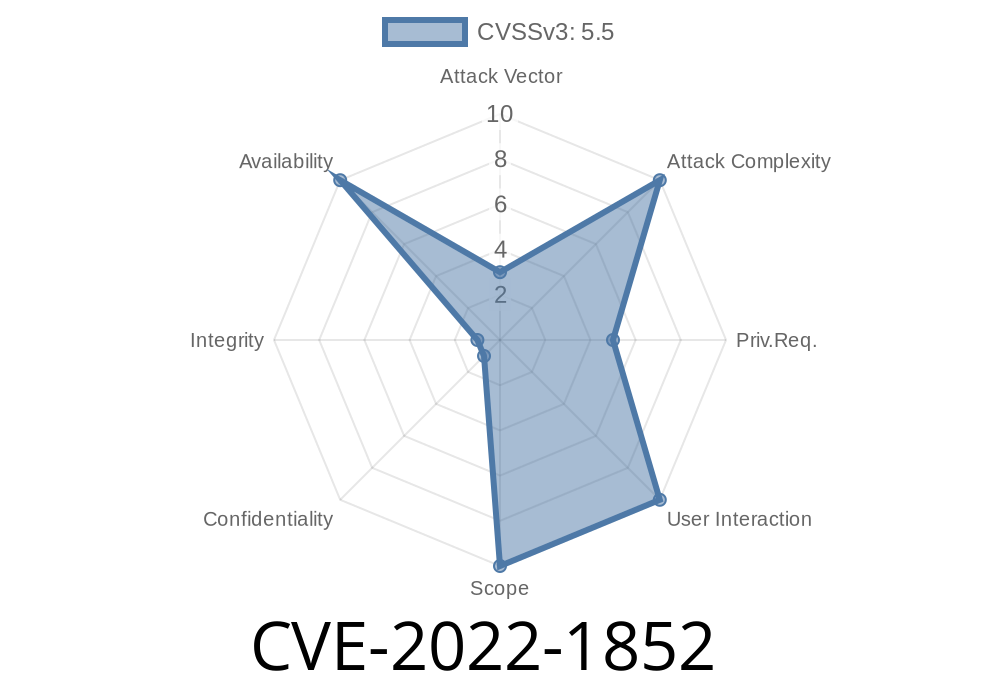When running virtual machines (VMs) on Linux — especially with KVM (Kernel-based Virtual Machine) — you trust that even misbehaving code inside your guest OS won’t crash the host system. However, the security flaw CVE-2022-1852 breaks that trust to some extent. Let's break down what this bug is, how it arises, and what an attacker could do with it.
What is CVE-2022-1852?
CVE-2022-1852 refers to a NULL pointer dereference vulnerability in the Linux kernel’s KVM module, specifically in the x86_emulate_insn() function located in arch/x86/kvm/emulate.c. KVM is responsible for handing off CPU instructions from a VM (guest) to the host. If certain bad instructions are executed inside a guest system, the handler in the host’s kernel might make a mistake, hitting a NULL pointer. That crash can kill the KVM process, making all VMs on that host go down — resulting in a classical Denial of Service (DoS).
Key Details
- Component Affected: KVM (Kernel Virtual Machine) module for x86/x86_64
- File: arch/x86/kvm/emulate.c
How the Flaw Works
Whenever a guest VM executes a CPU instruction that must be emulated in software (for example, privileged instructions or instructions not supported in hardware virtualization), KVM passes control to functions like x86_emulate_insn. Ideally, KVM validates all inputs and handles errors safely. Unfortunately, a certain code path allows a NULL pointer dereference if a crafted, illegal instruction is executed by the guest.
Emulation in host: KVM tries to emulate it, but the instruction isn’t valid.
3. NULL pointer usage: Due to faulty error checking, KVM dereferences a NULL pointer, promptly crashing the entire kernel thread (or potentially the host).
Here’s the relevant (simplified) snippet from the vulnerable Linux kernel sources
int x86_emulate_insn(..., struct kvm_vcpu *vcpu, ...) {
struct x86_emulate_ctxt *ctxt = NULL;
...
/* Normally ctxt is set up, but a certain failure path leaves it NULL */
...
do_some_use(ctxt->something); // <- NULL pointer dereference!
}
If the guest instruction causes ctxt to be never set up (remaining NULL), the subsequent access crashes the host kernel thread running the emulation.
Exploit Scenario: How an Attacker Can Use It
While exploitation is limited to a Denial of Service (it doesn't grant root or code execution on the host), a malicious or compromised guest VM can instantly crash the host’s KVM service or even the whole system. This is devastating in a production environment that relies on VM uptime with KVM.
Example Exploit (in pseudo-code)
This is how a guest can trigger the bug. (Practically, you’d need kernel-level code in the guest or something like QEMU with an extension.)
; x86 assembly (to be run in guest, provoke the bug)
db xf, x3f ; Some illegal instruction for this context
hlt ; halt (optional, catch the crash)
QEMU or other hypervisors can also be used to send purposely malformed instructions packets leading to the problematic code path.
Impact: Who Should Worry?
If you’re using KVM on Linux to host guest VMs — especially in environments where guests aren’t totally trusted — this flaw is directly relevant! Cloud providers, hosting operations, or anyone letting users launch their own VMs will find this bug worrisome.
Fix and Mitigation
The problem was publicly acknowledged in mid-2022, and kernel patches soon followed. The fix ensures all paths properly initialize and check pointers before dereferencing them, squashing the crash bug.
Here is the relevant upstream commit
Distribution advisories
- Red Hat Security Advisory
- Debian Security Tracker
- Canonical Ubuntu Notice
Summary Table
| Item | Details |
|----------------------|---------|
| CVE ID | CVE-2022-1852 |
| Vulnerability Type | NULL pointer dereference, DoS |
| Component | KVM (Linux kernel) |
| Exploitable by | Unprivileged guest user/VM |
| Impact | Host DoS (all VMs affected) |
| Fixed in | Kernel patch (see links) |
| Workaround | None other than patching |
Conclusion
CVE-2022-1852 is a classic example of how even basic pointer errors in a critical system layer like KVM can have major real-world impact — taking down hosts from inside a VM! If you use KVM or have users running VMs, update your Linux kernel without delay.
Further reading
- Kernel Patch Commit
- Red Hat Bugzilla
- NVD Entry
Timeline
Published on: 06/30/2022 13:15:00 UTC
Last modified on: 08/05/2022 17:15:00 UTC
